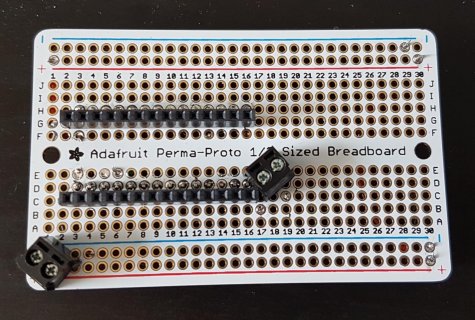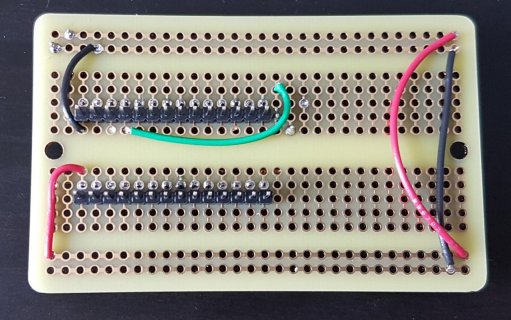(I'm not sure if this is poor form - this is a crosspost from over in the audio board. No one responded over a couple of days so I thought I'd try here)
I am working on a project that plays audio with the Teensy Audio shield. Using the included WavFilePlayer example, I can successfully play my wav file with a Teensy 3.2 connected directly to the audio shield.
As part of my project, I am connecting the Teensy and the Audio shield with a breadboard - specifically the Adafruit Proto 1/2-Sized Breadboard. If you're unfamiliar, this is a protoboard that mimics a prototyping breadboard layout. I have the Audio Shield and the Teensy offset from each other such that the signals are carried to the appropriate pins.
When I use my board between the two, the audio will play briefly as expected, but then loud, sharp static is heard, and then a loud tone. This does not happen reliably at any given point in the audio file, and I suspect it to be a hardware issue, but the board is very simple. I have probed various points and lines around the board and not found any unexpected shorts. The only non-ground and non-power pin that's soldered is Pin2, intended for LEDs in the near future.
I have experienced the same behavior with the tutorial audio files (specifically SDTEST2.WAV)
Here is a video showing the behavior (apologies for the low volume, and the Coke cans were a quick mount for my phone ):
):
Here are pictures of the board:
The Top:

The Bottom:

The screw terminals are at odd angles because their pitch isn't quite 2.54mm.
Here is the code that I'm using:
Anyone have any ideas what would cause this? My first thought is some sort of floating pin, but I can't think of anything in my board that would cause that. And I can't find any place on the board that's shorted.
I am working on a project that plays audio with the Teensy Audio shield. Using the included WavFilePlayer example, I can successfully play my wav file with a Teensy 3.2 connected directly to the audio shield.
As part of my project, I am connecting the Teensy and the Audio shield with a breadboard - specifically the Adafruit Proto 1/2-Sized Breadboard. If you're unfamiliar, this is a protoboard that mimics a prototyping breadboard layout. I have the Audio Shield and the Teensy offset from each other such that the signals are carried to the appropriate pins.
When I use my board between the two, the audio will play briefly as expected, but then loud, sharp static is heard, and then a loud tone. This does not happen reliably at any given point in the audio file, and I suspect it to be a hardware issue, but the board is very simple. I have probed various points and lines around the board and not found any unexpected shorts. The only non-ground and non-power pin that's soldered is Pin2, intended for LEDs in the near future.
I have experienced the same behavior with the tutorial audio files (specifically SDTEST2.WAV)
Here is a video showing the behavior (apologies for the low volume, and the Coke cans were a quick mount for my phone
Here are pictures of the board:
The Top:

The Bottom:

The screw terminals are at odd angles because their pitch isn't quite 2.54mm.
Here is the code that I'm using:
Code:
// Simple WAV file player example
//
// Three types of output may be used, by configuring the code below.
//
// 1: Digital I2S - Normally used with the audio shield:
// http://www.pjrc.com/store/teensy3_audio.html
//
// 2: Digital S/PDIF - Connect pin 22 to a S/PDIF transmitter
// https://www.oshpark.com/shared_projects/KcDBKHta
//
// 3: Analog DAC - Connect the DAC pin to an amplified speaker
// http://www.pjrc.com/teensy/gui/?info=AudioOutputAnalog
//
// To configure the output type, first uncomment one of the three
// output objects. If not using the audio shield, comment out
// the sgtl5000_1 lines in setup(), so it does not wait forever
// trying to configure the SGTL5000 codec chip.
//
// The SD card may connect to different pins, depending on the
// hardware you are using. Uncomment or configure the SD card
// pins to match your hardware.
//
// Data files to put on your SD card can be downloaded here:
// http://www.pjrc.com/teensy/td_libs_AudioDataFiles.html
//
// This example code is in the public domain.
#include <Audio.h>
#include <Wire.h>
#include <SPI.h>
#include <SD.h>
#include <SerialFlash.h>
AudioPlaySdWav playWav1;
// Use one of these 3 output types: Digital I2S, Digital S/PDIF, or Analog DAC
AudioOutputI2S audioOutput;
//AudioOutputSPDIF audioOutput;
//AudioOutputAnalog audioOutput;
AudioConnection patchCord1(playWav1, 0, audioOutput, 0);
AudioConnection patchCord2(playWav1, 1, audioOutput, 1);
AudioControlSGTL5000 sgtl5000_1;
// Use these with the Teensy Audio Shield
#define SDCARD_CS_PIN 10
#define SDCARD_MOSI_PIN 7
#define SDCARD_SCK_PIN 14
// Use these with the Teensy 3.5 & 3.6 SD card
//#define SDCARD_CS_PIN BUILTIN_SDCARD
//#define SDCARD_MOSI_PIN 11 // not actually used
//#define SDCARD_SCK_PIN 13 // not actually used
// Use these for the SD+Wiz820 or other adaptors
//#define SDCARD_CS_PIN 4
//#define SDCARD_MOSI_PIN 11
//#define SDCARD_SCK_PIN 13
void setup() {
Serial.begin(9600);
// Audio connections require memory to work. For more
// detailed information, see the MemoryAndCpuUsage example
AudioMemory(8);
// Comment these out if not using the audio adaptor board.
// This may wait forever if the SDA & SCL pins lack
// pullup resistors
sgtl5000_1.enable();
sgtl5000_1.volume(0.25);
SPI.setMOSI(SDCARD_MOSI_PIN);
SPI.setSCK(SDCARD_SCK_PIN);
if (!(SD.begin(SDCARD_CS_PIN))) {
// stop here, but print a message repetitively
while (1) {
Serial.println("Unable to access the SD card");
delay(500);
}
}
}
void playFile(const char *filename)
{
Serial.print("Playing file: ");
Serial.println(filename);
// Start playing the file. This sketch continues to
// run while the file plays.
playWav1.play(filename);
// A brief delay for the library read WAV info
delay(5);
// Simply wait for the file to finish playing.
while (playWav1.isPlaying()) {
// uncomment these lines if you audio shield
// has the optional volume pot soldered
// float vol = analogRead(15);
// vol = vol / 1024;
// sgtl5000_1.volume(vol);
}
}
void loop() {
playFile("teacups.wav"); // filenames are always uppercase 8.3 format
delay(500);
// playFile("SDTEST2.WAV");
// delay(500);
// playFile("SDTEST3.WAV");
// delay(500);
// playFile("SDTEST4.WAV");
delay(1500);
}Anyone have any ideas what would cause this? My first thought is some sort of floating pin, but I can't think of anything in my board that would cause that. And I can't find any place on the board that's shorted.

